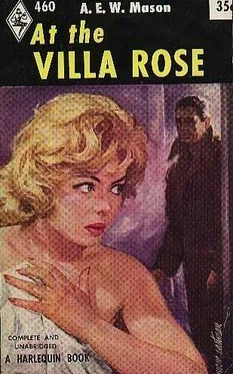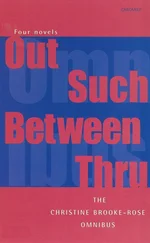A Mason - At the Villa Rose
Здесь есть возможность читать онлайн «A Mason - At the Villa Rose» весь текст электронной книги совершенно бесплатно (целиком полную версию без сокращений). В некоторых случаях можно слушать аудио, скачать через торрент в формате fb2 и присутствует краткое содержание. Год выпуска: 1910, Жанр: Классический детектив, на английском языке. Описание произведения, (предисловие) а так же отзывы посетителей доступны на портале библиотеки ЛибКат.
- Название:At the Villa Rose
- Автор:
- Жанр:
- Год:1910
- ISBN:нет данных
- Рейтинг книги:5 / 5. Голосов: 1
-
Избранное:Добавить в избранное
- Отзывы:
-
Ваша оценка:
- 100
- 1
- 2
- 3
- 4
- 5
At the Villa Rose: краткое содержание, описание и аннотация
Предлагаем к чтению аннотацию, описание, краткое содержание или предисловие (зависит от того, что написал сам автор книги «At the Villa Rose»). Если вы не нашли необходимую информацию о книге — напишите в комментариях, мы постараемся отыскать её.
At the Villa Rose — читать онлайн бесплатно полную книгу (весь текст) целиком
Ниже представлен текст книги, разбитый по страницам. Система сохранения места последней прочитанной страницы, позволяет с удобством читать онлайн бесплатно книгу «At the Villa Rose», без необходимости каждый раз заново искать на чём Вы остановились. Поставьте закладку, и сможете в любой момент перейти на страницу, на которой закончили чтение.
Интервал:
Закладка:
At first Celia shrank away, fearing some new cruelty. But Adele’s voice came to her ears, speaking-and speaking with remorse.
"I can’t endure it!" she whispered. "You are so young-too young to be killed."
The tears were rolling down Celia’s cheeks. Her face was pitiful and beseeching.
"Don’t look at me like that, for God’s sake, child!" Adele went on, and she chafed the girl’s ankles for a moment.
"Can you stand?" she asked.
Celia nodded her head gratefully. After all, then, she was not to die. It seemed to her hardly possible. But before she could rise a subdued whirr of machinery penetrated into the room, and the motor-car came slowly to the front of the villa.
"Keep still!" said Adele hurriedly, and she placed herself in front of Celia.
Wethermill opened the wooden door, while Celia’s heart raced in her bosom.
"I will go down and open the gate," he whispered. "Are you ready?"
"Yes."
Wethermill disappeared; and this time he left the door open. Adele helped Celia to her feet. For a moment she tottered; then she stood firm.
"Now run!" whispered Adele. "Run, child, for your life!"
Celia did not stop to think whither she should run, or how she should escape from Wethermill’s search. She could not ask that her lips and her hands might be freed. She had but a few seconds. She had one thought-to hide herself in the darkness of the garden. Celia fled across the room, sprang wildly over the sill, ran, tripped over her skirt, steadied herself, and was swung off the ground by the arms of Harry Wethermill.
"There we are," he said, with his shrill, wavering laugh. "I opened the gate before." And suddenly Celia hung inert in his arms.
The light went out in the salon. Adele Rossignol, carrying Celia’s cloak, stepped out at the side of the window.
"She has fainted," said Wethermill. "Wipe the mould off her shoes and off yours too-carefully. I don’t want them to think this car has been out of the garage at all."
Adele stooped and obeyed. Wethermill opened the door of the car and flung Celia into a seat. Adele followed and took her seat opposite the girl. Wethermill stepped carefully again on to the grass, and with the toe of his shoe scraped up and ploughed the impressions which he and Adele Rossignol had made on the ground, leaving those which Celia had made. He came back to the window.
"She has left her footmarks clear enough," he whispered. "There will be no doubt in the morning that she went of her own free will."
Then he took the chauffeur’s seat, and the car glided silently down the drive and out by the gate. As soon as it was on the road it stopped. In an instant Adele Rossignol’s head was out of the window.
"What is it?" she exclaimed in fear.
Wethermill pointed to the roof. He had left the light burning in Helene Vauquier’s room.
"We can’t go back now," said Adele in a frantic whisper. "No; it is over. I daren’t go back." And Wethermill jammed down the lever. The car sprang forward, and humming steadily over the white road devoured the miles. But they had made their one mistake.
CHAPTER XX
The car had nearly reached Annecy before Celia woke to consciousness. And even then she was dazed. She was only aware that she was in the motor-car and travelling at a great speed. She lay back, drinking in the fresh air. Then she moved, and with the movement came to her recollection and the sense of pain. Her arms and wrists were still bound behind her, and the cords hurt her like hot wires. Her mouth, however, and her feet were free. She started forward, and Adele Rossignol spoke sternly from the seat opposite.
"Keep still. I am holding the flask in my hand. If you scream, if you make a movement to escape, I shall fling the vitriol in your face," she said.
Celia shrank back, shivering.
"I won’t! I won’t!" she whispered piteously. Her spirit was broken by the horrors of the night’s adventure. She lay back and cried quietly in the darkness of the carriage. The car dashed through Annecy. It seemed incredible to Celia that less than six hours ago she had been dining with Mme. Dauvray and the woman opposite, who was now her jailer. Mme. Dauvray lay dead in the little salon, and she herself-she dared not think what lay in front of her. She was to be persuaded-that was the word-to tell what she did not know. Meanwhile her name would be execrated through Aix as the murderess of the woman who had saved her. Then suddenly the car stopped. There were lights outside. Celia heard voices. A man was speaking to Wethermill. She started and saw Adele Tace’s arm flash upwards. She sank back in terror; and the car rolled on into the darkness. Adele Tace drew a breath of relief. The one point of danger had been passed. They had crossed the Pont de la Caille, they were in Switzerland.
Some long while afterwards the car slackened its speed. By the side of it Celia heard the sound of wheels and of the hooves of a horse. A single-horsed closed landau had been caught up as it jogged along the road. The motor-car stopped; close by the side of it the driver of the landau reined in his horse. Wethermill jumped down from the chauffeur’s seat, opened the door of the landau, and then put his head in at the window of the car.
"Are you ready? Be quick!"
Adele turned to Celia.
"Not a word, remember!"
Wethermill flung open the door of the car. Adele took the girl’s feet and drew them down to the step of the car. Then she pushed her out. Wethermill caught her in his arms and carried her to the landau. Celia dared not cry out. Her hands were helpless, her face at the mercy of that grim flask. Just ahead of them the lights of Geneva were visible, and from the lights a silver radiance overspread a patch of sky. Wethermill placed her in the landau; Adele sprang in behind her and closed the door. The transfer had taken no more than a few seconds. The landau jogged into Geneva; the motor turned and sped back over the fifty miles of empty road to Aix.
As the motor-car rolled away, courage returned for a moment to Celia. The man-the murderer-had gone. She was alone with Adele Rossignol in a carriage moving no faster than an ordinary trot. Her ankles were free, the gag had been taken from her lips. If only she could free her hands and choose a moment when Adele was off her guard she might open the door and spring out on to the road. She saw Adele draw down the blinds of the carriage, and very carefully, very secretly, Celia began to work her hands behind her. She was an adept; no movement was visible, but, on the other hand, no success was obtained. The knots had been too cunningly tied. And then Mme. Rossignol touched a button at her side in the leather of the carriage.
The touch turned on a tiny lamp in the roof of the carriage, and she raised a warning hand to Celia.
"Now keep very quiet."
Right through the empty streets of Geneva the landau was quietly driven. Adele had peeped from time to time under the blind. There were few people in the streets. Once or twice a sergent-de-ville was seen under the light of a lamp. Celia dared not cry out. Over against her, persistently watching her, Adele Rossignol sat with the open flask clenched in her hand, and from the vitriol Celia shrank with an overwhelming terror. The carriage drove out from the town along the western edge of the lake.
"Now listen," said Adele. "As soon as the landau stops the door of the house opposite to which it stops will open. I shall open the carriage door myself and you will get out. You must stand close by the carriage door until I have got out. I shall hold this flask ready in my hand. As soon as I am out you will run across the pavement into the house. You won’t speak or scream."
Adele Rossignol turned out the lamp and ten minutes later the carriage passed down the little street and attracted Mme. Gobin’s notice. Marthe Gobin had lit no light in her room. Adele Rossignol peered out of the carriage. She saw the houses in darkness. She could not see the busybody’s face watching the landau from a dark window. She cut the cords which fastened the girl’s hands. The carriage stopped. She opened the door. Celia sprang out on to the pavement. She sprang so quickly that Adele Rossignol caught and held the train of her dress. But it was the fear of the vitriol which had made her spring so nimbly. It was that, too, which made her run so lightly and quickly into the house. The old woman who acted as servant, Jeanne Tace, received her. Celia offered no resistance. The fear of vitriol had made her supple as a glove. Jeanne hurried her down the stairs into the little parlour at the back of the house, where supper was laid, and pushed her into a chair. Celia let her arms fall forward on the table. She had no hope now. She was friendless and alone in a den of murderers, who meant first to torture, then to kill her. She would be held up to execration as a murderess. No one would know how she had died or what she had suffered. She was in pain, and her throat burned. She buried her face in her arms and sobbed. All her body shook with her sobbing. Jeanne Rossignol took no notice. She treated Celie just as the others had done. Celia was la petite, against whom she had no animosity, by whom she was not to be touched to any tenderness. La petite had unconsciously played her useful part in their crime. But her use was ended now, and they would deal with her accordingly. She removed the girl’s hat and cloak and tossed them aside.
Читать дальшеИнтервал:
Закладка:
Похожие книги на «At the Villa Rose»
Представляем Вашему вниманию похожие книги на «At the Villa Rose» списком для выбора. Мы отобрали схожую по названию и смыслу литературу в надежде предоставить читателям больше вариантов отыскать новые, интересные, ещё непрочитанные произведения.
Обсуждение, отзывы о книге «At the Villa Rose» и просто собственные мнения читателей. Оставьте ваши комментарии, напишите, что Вы думаете о произведении, его смысле или главных героях. Укажите что конкретно понравилось, а что нет, и почему Вы так считаете.












